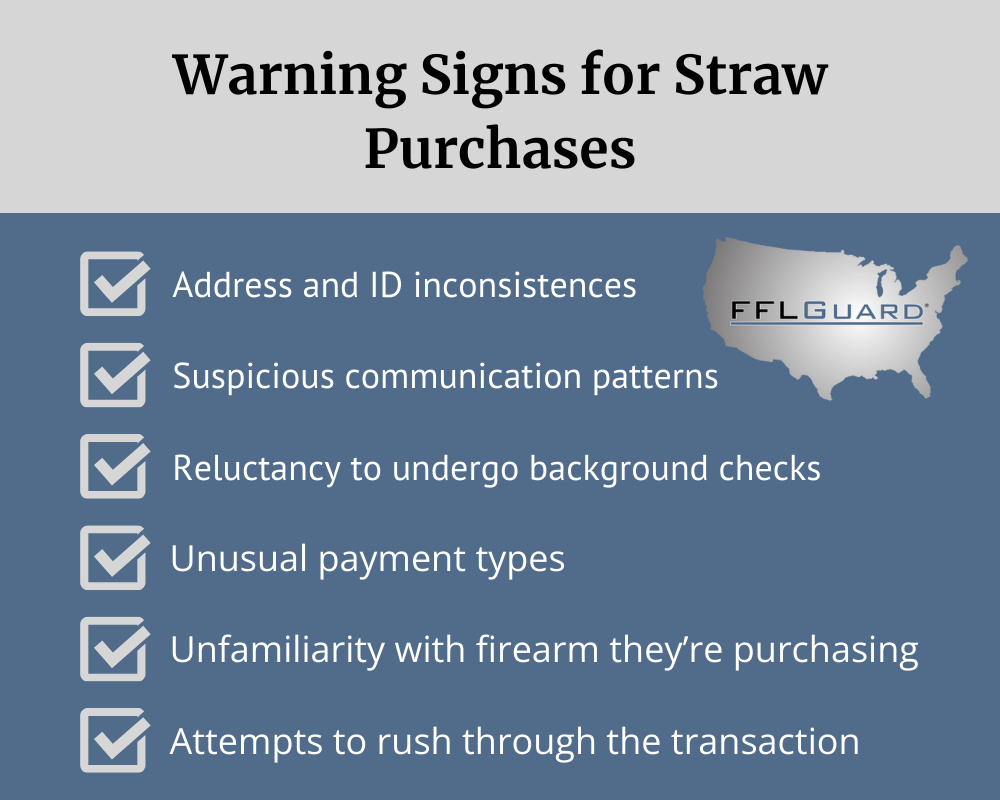Table of Contents
The Short Answer: A straw purchase occurs when someone buys a firearm on behalf of another person who may or may not be legally prohibited from doing so. This practice carries severe penalties under federal and state law for FFLs, even if the illegal transaction is carried out unknowingly by the FFL. It is essential to remain vigilant and identify the signs of a straw purchase and stop the process immediately.
For Federal Firearms Licensees (FFLs), understanding and preventing straw purchases is not just a legal obligation—it’s a critical responsibility that helps safeguard communities and protect their business. Under the recent Bipartisan Safer Communities Act, straw purchases have become an even more serious criminal offense, with penalties increasing to potentially 25 years imprisonment if the firearm is used in a violent crime, terrorism, or drug trafficking. That’s in addition to a fine of up to $250,000. Under the Act, FFLs that are part of the straw purchase not only face revocation, but fines and potentially criminal charges.
As the first line of defense against illegal firearm transactions, FFLs must remain vigilant in identifying and preventing straw purchases. Understanding what constitutes a straw purchase and exploring its serious implications for firearms dealers helps FFLs protect their businesses while maintaining strict compliance with regulations in the United States.
Understanding Straw Purchases
A straw purchase occurs when someone buys a firearm on behalf of another person who may or may not be legally prohibited from firearm possession or purchases. This practice is a federal crime that undermines firearms regulations designed to keep weapons out of the hands of prohibited persons. This illegal activity involves a “straw buyer” who appears to be the actual buyer but is actually acquiring the firearm for someone else. Keep in mind, the person for whom the firearm is being acquired does not need to be a prohibited person for the transaction to be a straw purchase. Any person claiming to be the purchaser who is not the actual individual whom will possess the firearm is a straw purchaser.
The legal framework addressing straw purchases has evolved significantly over time. Originally addressed primarily through the Gun Control Act of 1968, the Brady Handgun Violence Prevention Act of 1993 established the background check system that forms the foundation of today’s purchasing requirements. In 2022, the Bipartisan Safer Communities Act established new criminal offenses specifically targeting straw purchases and reinforced existing federal prohibitions. Straw purchases now carry severe penalties including up to 15 years imprisonment and a $250,000 fine. If the illegally purchased firearm is used in a felony, act of terrorism, or drug trafficking crime, the prison sentence can increase to 25 years.
Federal law explicitly defines several categories of prohibited persons who cannot legally possess firearms or purchase firearms from an FFL. A prohibited person includes:
- Individuals with a conviction of crimes punishable by imprisonment exceeding one year, even if given a lesser sentence
- Fugitives from justice
- Unlawful users or those addicted to controlled substances, including marijuana
- Persons adjudicated as mentally defective or committed to mental institutions
- Illegal aliens and most nonimmigrant aliens
- Those dishonorably discharged from the armed forces
- Individuals who have renounced U.S. citizenship
- Persons subject to various types of restraining orders
- Those convicted of a misdemeanor crime of domestic violence
- Individuals under indictment for felony crimes or crimes punishable by imprisonment exceeding one year
Common illegal straw purchase scenarios often involve family members or friends buying firearms for other persons, romantic partners purchasing for their significant others who, in many cases, cannot legally own firearms, or individuals being paid to make purchases for others. The Bureau of Alcohol, Tobacco, Firearms, and Explosives (ATF) regularly encounters cases where people claim they were “doing a favor” for someone, not realizing they were committing a serious criminal offense that could result in significant prison time and substantial fines.
Making a false statement on ATF Form 4473, which requires the buyer to confirm they are the actual buyer or actual transferee of the firearm as well as state they do not intend to sell or dispose of any firearm to any prohibited person, is itself a federal crime. When an individual provides false information during firearm transactions by claiming to be the actual buyer when they are not or attest they will not transfer the firearm to a prohibited person, they have committed a felony offense that federal prosecutors take very seriously.

Legal Consequences and Penalties for FFLs
For a licensed firearm dealer, the consequences of knowingly facilitating or failing to prevent straw purchases can be devastating. The ATF may initiate immediate license revocation proceedings, effectively ending the dealer’s ability to conduct business. Beyond license revocation, FFLs may face substantial civil monetary penalties and potential criminal prosecution. The reputational damage to a firearms business can be irreparable, leading to the loss of customer trust, community regard and industry standing.
Federal law enforcement agencies actively investigate suspected straw buying, using surveillance, confidential informants, and transaction records to build cases against violators. State laws add another layer of compliance, with many jurisdictions imposing additional penalties and restrictions. Some states have passed laws allowing asset forfeiture and mandatory minimum sentences for straw purchase violations, many of which an FFL may be subject.

Identifying and Preventing Straw Purchases
Identifying and preventing straw purchases is a critical responsibility for FFLs that requires vigilance and proper training. Several key behavioral indicators and documentation concerns can signal potential straw purchasers.
Straw Purchase Red Flags for FFLs
Every licensed firearms dealer should watch for specific red flags that might indicate an alleged straw purchase, including:
- Unfamiliarity with the firearm they’re purchasing
- Limited knowledge about the firearm’s features and operation
- Little interest in physically holding or inspecting the firearm
- Suspicious communication patterns, such as frequent phone calls or text messages during the transaction
- Reluctancy to complete paperwork or undergo background checks
- Attempted avoidance of any cameras or discomfort with recording
- Attempts to rush through the process without asking typical buyer questions
- Attempts to pay with a credit card without his/her name or pays in large amounts of cash
Documentation and Transaction Warning Signs
When processing firearm purchases, pay close attention to payment methods and purchasing patterns. Some signs to note include:
- Multiple money orders or unusual combinations of payment types
- Buyers selecting firearms that don’t align with their stated intended use
- Purchasing multiple similar firearms without clear justification
- Inconsistencies with addresses
- Identification documents that appear new, altered, or inconsistent with the buyer’s appearance
- Reluctance to provide additional verification when requested

Best Practices to Prevent Straw Purchases
There are several business-wide practices that FFLs can take to stay on top of straw purchases:
- Training: Implement comprehensive staff training programs that cover straw purchase identification and proper response protocols.
- Transaction Documentation: Establish clear procedures that go beyond minimum requirements, which might include transaction notes or customer interaction records.
- Point of Sale Protocols: At the point of sale, consistently follow established systems for every transaction, regardless of circumstances or pressure to complete sales quickly. This can include:
- Thorough completion of ATF Form 4473
- Careful review of identification documents
- Clear communication about legal requirements and penalties for false statements
- Suspicious Activity Review: Consider implementing a policy requiring management review for suspicious transactions or high-risk sales patterns.
- Unwavering Support: Once any employee has stated the transaction should not continue, for any reason, he or she must be supported by all staff; no senior employee or owner should be allowed to overturn the employee’s decision to stop the transaction.
Through diligent application of these practices, FFLs can significantly reduce their risk exposure while maintaining their crucial role in preventing illegal firearm transfers.
Protect Yourself from Straw Purchases with FFLGuard
Straw purchases represent a serious threat to public safety and can result in devastating consequences for a licensed dealer who fails to prevent them. For FFLs, maintaining robust compliance protocols isn’t just about following the law—it’s about protecting your business, your license, your reputation, and the safety of the community where you work and live.
Protecting your FFL business requires a multi-faceted approach, including comprehensive staff training, careful transaction monitoring, avoiding transferring standards, and maintaining detailed records. Professional compliance services can provide crucial support through mock ATF audits, ongoing training programs, and expert legal guidance. These services help ensure your business stays ahead of regulatory requirements while identifying potential vulnerabilities before they become problems.
Don’t take chances with your firearms business- partner with FFLGuard’s experienced firearms compliance professionals who understand the complexities of straw purchase prevention and ATF regulations. Learn more about our service plans and how our customized compliance services, legal helpdesk, and dedicated defense fund can help protect your business from straw purchase liability and ensure long-term success.

